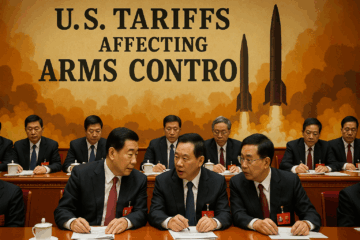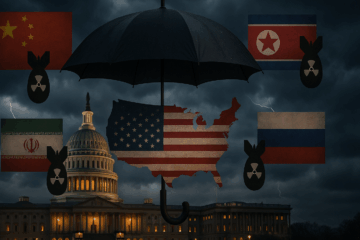Nuclear weapons have long been considered a double-edged sword in international relations—capable of both preventing conflicts through deterrence and posing existential threats if mismanaged. In this delicate balance, two key elements emerge as critical for nuclear deterrence credibility and effectiveness: escalation dominance and the control of international narratives. This article explores the interconnectedness of these elements and their significance in maintaining peace and stability in the strategic environment.
Escalation Dominance
Escalation dominance refers to a nation’s ability to control and dictate the pace and intensity of a conflict, particularly when nuclear weapons are involved. In the context of nuclear deterrence, it becomes essential for a nation possessing such capabilities to showcase a clear and overwhelming advantage in terms of the scale and sophistication of its nuclear arsenal. This superiority discourages potential adversaries from engaging in actions that might lead to a nuclear confrontation.
One aspect of escalation dominance is the possession of a diverse range of nuclear capabilities, including strategic and tactical weapons. Strategic weapons are designed for long-range attacks on major targets, while tactical weapons are intended for use in more localized conflicts and are often of much lower yields. The combination of both types of weapons enhances a nation’s flexibility and adaptability in responding to different threat scenarios, reinforcing its position of escalation dominance.
Moreover, modernizing nuclear arsenals with advanced technologies, such as hypersonic delivery systems and precision-guided munitions, further solidifies a nation’s escalation dominance. The continuous development and enhancement of nuclear capabilities are intended to act as a powerful deterrent, dissuading potential adversaries from challenging the status quo.
Narrative Control
In the contemporary era, where information flows rapidly across borders, the control of international narratives is equally crucial for effective nuclear deterrence. The narrative surrounding a nation’s nuclear capabilities, intentions, and strategic outlook can significantly influence global perceptions and responses. Therefore, shaping and managing this narrative becomes a vital component of maintaining a credible deterrent.
International narratives are shaped through diplomatic channels, public communications, and media engagement. Nations with nuclear capabilities must articulate a clear and consistent message about the responsible and restrained use of their nuclear arsenal. Emphasizing a commitment to arms control, nonproliferation, and disarmament initiatives (whether one follows through with them or not) helps build trust and reduces the likelihood of misunderstandings that could lead to conflict.
Strategic communication also plays a pivotal role in deterring potential adversaries. By effectively conveying the consequences of hostile actions and highlighting the unwavering commitment to national security, a nation can discourage aggressive behavior and maintain a stable international environment.
Interconnected Dynamics
The effectiveness of nuclear deterrence relies on the seamless integration of escalation dominance and narrative control. Escalation dominance alone may not be sufficient if a nation fails to communicate its intentions clearly and reassure the international community of its responsible behavior. Conversely, narrative control without credible escalation dominance may lead to perceptions of weakness, inviting potential aggressors to test boundaries.
The interconnected dynamics of escalation dominance and narrative control form a symbiotic relationship. A nation’s ability to demonstrate overwhelming military capabilities enhances the credibility of its strategic messaging, reinforcing the perception that any conflict would be unwinnable. Conversely, a well-crafted narrative that emphasizes responsible behavior and a commitment to peace complements the deterrent effect of military capabilities.
Conclusion
In the complex realm of nuclear deterrence, the synergy between escalation dominance and narrative control stands as the linchpin in the delicate dance of maintaining global stability and preventing conflict. As nations navigate the intricate landscape of international relations, the imperative to invest in both military capabilities and strategic communications becomes increasingly apparent. The symbiotic relationship between escalation dominance and narrative control underscores the multidimensional nature of effective deterrence.
Advances in technology and a worsening security environment add another layer of complexity to the challenge. Nations must not only stay ahead in terms of military advancements but also adapt their communication strategies to resonate with the contemporary world. The rise of social media and instant global communication necessitates a nuanced approach in crafting and disseminating narratives. The global audience, armed with instant access to information, demands transparency and coherence in the messages conveyed by nuclear powers.
Looking forward, the ability to balance these elements becomes more than a strategic necessity; it becomes imperative for the survival of a peaceful international order. Nations that excel in both the formidable display of military capabilities and the art of narrative persuasion are better equipped to deter potential adversaries effectively. The delicate interplay between escalation dominance and narrative control remains not only relevant but increasingly vital in an ever-changing world, where the specter of nuclear conflict looms over the delicate equilibrium of global relations. As the international community grapples with emerging challenges, the mastery of this delicate dance remains an ongoing commitment to a safer and more secure world.
Aaron Holland is an Analyst at the National Institute for Deterrence Studies.
About the Author

Aaron Holland
Aaron Holland is an Analyst at the National Institute for Deterrence Studies.




